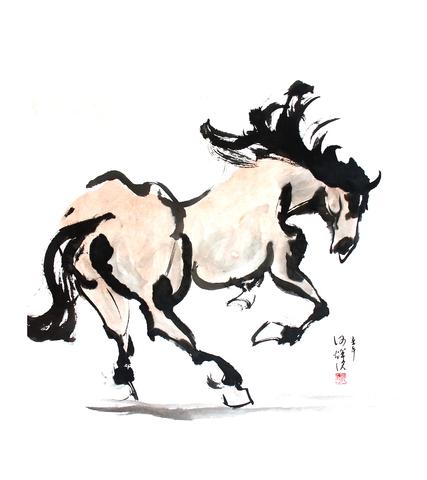Of all twelve animals of the Chinese zodiac, the dragon is probably the best known. It is a mystical beast of course, and in many respects is seen as being akin to the snake, whose year just ended. Interestingly, the dragon also has close connections with the animal of this New Year, the horse, which for some expresses the spirit of the dragon.
To describe someone as having "the spirit of a dragon or a horse"(
But the high status of horses actually goes much further back than the Yuan dynasty. In the vastly venerable Book of Rites (

ILLUSTRATION: HO HUEI-TSE
In literature, the fortitude and strength of the horse is celebrated in Journey to the West (
In Chinese astrology, people born in a horse year partake of many of the contradiction of the historical horse, in which there is a mixture of power and submission. Generally speaking, a horse person is a worker and is adept at handling money. But unfortunately, he is also famous for suddenly losing interest.
Horses are proud yet sweet natured, arrogant yet oddly modest in their approach to love, envious but tolerant, conceited yet humble. They want to belong, yet they are burdened by their need for independence. They need love and crave intimacy yet often feel cornered, pressured. But in the final analysis -- ?if analysis comes into this at all -- the horse is an individual who depends only on his wits and his labor to get what he wants.
For those of a philosophic bent, the horse has also proved useful for proving that what you see is not always what you get. Of course, it all started off with Kung-Sun Long and his absurd discourse about a white horse not being a horse (
But probably the best-known and most appropriate story to do with a horse in these uncertain times is the one about the old man and the horse he lost. It goes something like this: One day, a horse escaped from a horse breeder's stables. His neighbors came round to sympathize with him on his loss. The old man did not seem worried and simply said, "Who knows, this might even be good fortune." His neighbors were nonplused at his attitude. Soon afterward, the escaped horse returned, bringing with it another excellent horse. When his neighbors heard, they came to congratulate him, but the old man simply replied, "Who knows, this could be bad fortune." Not long after that, the son of the old man fell while riding the new horse, breaking his leg. The neighbors simply couldn't understand how the old man could think this might be good fortune -- ?not until the northern barbarians invaded and all able-bodied young men were drafted into the army. Many died in the fighting, but the old man's son stayed at home nursing his leg, and at least kept alive. Only then did the old man's neighbors understand the wisdom of the phrase "how do you know that losing a horse isn't a piece of luck" (
So wishing everyone equine equanimity in the face of contradictions and the slings and arrows of outrageous fortune in the year of the horse.

The canonical shot of an East Asian city is a night skyline studded with towering apartment and office buildings, bright with neon and plastic signage, a landscape of energy and modernity. Another classic image is the same city seen from above, in which identical apartment towers march across the city, spilling out over nearby geography, like stylized soldiers colonizing new territory in a board game. Densely populated dynamic conurbations of money, technological innovation and convenience, it is hard to see the cities of East Asia as what they truly are: necropolises. Why is this? The East Asian development model, with

This is a deeply unsettling period in Taiwan. Uncertainties are everywhere while everyone waits for a small army of other shoes to drop on nearly every front. During challenging times, interesting political changes can happen, yet all three major political parties are beset with scandals, strife and self-inflicted wounds. As the ruling party, the Democratic Progressive Party (DPP) is held accountable for not only the challenges to the party, but also the nation. Taiwan is geopolitically and economically under threat. Domestically, the administration is under siege by the opposition-controlled legislature and growing discontent with what opponents characterize as arrogant, autocratic

June 16 to June 22 The following flyer appeared on the streets of Hsinchu on June 12, 1895: “Taipei has already fallen to the Japanese barbarians, who have brought great misery to our land and people. We heard that the Japanese occupiers will tax our gardens, our houses, our bodies, and even our chickens, dogs, cows and pigs. They wear their hair wild, carve their teeth, tattoo their foreheads, wear strange clothes and speak a strange language. How can we be ruled by such people?” Posted by civilian militia leader Wu Tang-hsing (吳湯興), it was a call to arms to retake

When Lisa, 20, laces into her ultra-high heels for her shift at a strip club in Ukraine’s Kharkiv, she knows that aside from dancing, she will have to comfort traumatized soldiers. Since Russia’s 2022 invasion, exhausted troops are the main clientele of the Flash Dancers club in the center of the northeastern city, just 20 kilometers from Russian forces. For some customers, it provides an “escape” from the war, said Valerya Zavatska — a 25-year-old law graduate who runs the club with her mother, an ex-dancer. But many are not there just for the show. They “want to talk about what hurts,” she